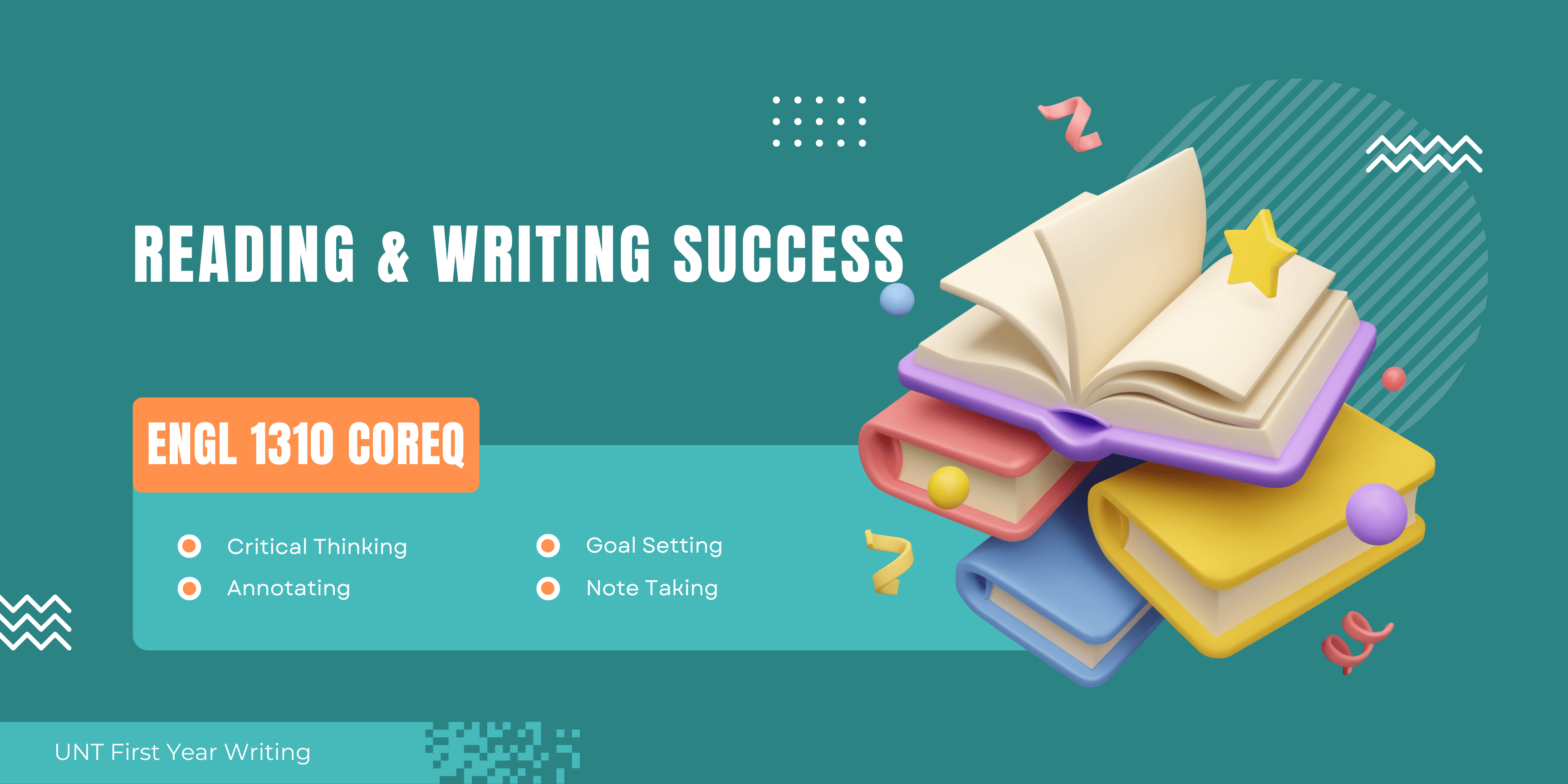About TSIW 1300
For developmental English, you will take two courses: ENGL 1310 and TSIW 1300. ENGL 1310 is the same English course that most UNT freshmen take, but TSIW 1300 — also known as "the corequisite", or "coreq" — is unique to you.
Here's what to know about TSIW 1300.
IMPORTANT: Always read your syllabus to get the most complete, up-to-date information! This information does not cover everything, and it does not replace your course syllabus.

What Skills Will You Learn?
Getting through college (and life) requires much more than just reading and writing. So, we will practice much more than just reading and writing. You will learn the following skills:
|
|
|
| How to set goals |
|
| How to think critically |
|
| How to think introspecitvely |
|
| How to take process information |
|
| How to read closely |
|
What Will We Do?
To learn the skills you need to succeed (both in the classroom and beyond), you will practice specific study skills, apply what you learn to your ENGL 1310 major assignments, and develop material for your ENGL 1310 essays.
To do this, you will
- read several short texts
- write five short reflections
- attend nine workshops (done during TSIW 1300 class time)
- attend two tutorials (done outside of class time and scheduled by you)
You must complete these to pass the course.
Workshops
You will attend nine workshops this semester. Workshops are one hour long and take place during your TSIW 1300 class. This means you will only attend TSIW 1300 nine times this semester (once every other week).
You MUST attend the first day of TSIW 1300. During the first class meeting, your instructor will tell you which days you do and do not need to come to class. (To attend the first day of TSIW 1300, go to the room at the date and time listed on your class schedule, just like your other classes. TSIW begins on the first week of classes.)
Reminder: Check the academic calendar to for the start date of classes.
Tutorials
You must attend two one-on-one tutorials. Unlike workshops, you must schedule these yourself because they do not happen during class time. There are two ways to attend a tutorial:
|
|
|
| Method 1: Walk in during student hours. |
|
| Method 2: Schedule an appointment. |
|
Note: Scheduled appointments get preference over walk-ins.
Reflections
You will complete five short writing assignments. These are designed to make you think critically about your learning progress.
This semester, the prompts are as follows:
- Reflection 1 | How will setting specific, measurable, attainable, relevant, time bound goals help you succeed?
- Reflection 2 | Why does being a strong reader make you a better writer?
- Reflection 3 | Why is asking questions complicated, and how can you ask the right questions to get the information you need?
- Reflection 4 | How is it possible for one idea to mean multiple things to multiple people? Is that good or bad?
- Reflection 5 | Why is it important to regularly and consciously do a personal inventory of your thoughts, feelings, goals, and achievements?
Readings
You will have two readings for every module. They include
- Twilight book excerpt
- Twilight film clip
- Interview With a Vampire by Anne Rice
- "Interview With a Vampire" television series clip
- "I Look at the World" by Langston Hughes
- Knives Out excerpt
- "Mother Tongue" by Amy Tan
- Why Introspection Matters
How Will You Be Graded?
IMPORTANT: Always check your course syllabus for up-to-date grading information.
Overall Course Grade
Unlike most classes, TSIW 1300 is pass / fail. That means any grade at or above 70% is considered an A (4.0 GPA), and anything below 70% is considered an F (0.0 GPA).
To pass, your overall grade must be at least a 70%.
Assignment Grade Breakdown
Your work will be evaluated using the following scale:
|
|
|
|
|
| Workshops | 5 | 40 (9 workshops) |
You will recieve the full 5 points if you arrive on time and stay for the entire workshop. |
| Tutorials | 10 | 20 (2 tutorials) |
You will recieve the full points 10 for attending a 30 minute tutorial. |
| Reflections | 10 | 40 (5 reflections) |
You will receive the full points 8 if you follow instructions and submit your work
on time. |
| Overall TSIW Course Grade | N/A | 100 points | All of the above are added together to make up your total grade for the class. |
What supplies do you need?
All your reading materials for this class are available online through Canvas. In addition, we will also do activities in class, so always come prepared with the following:
- Laptop — if you don’t have one, you can check one out from AUDB 102. You can also borrow one from the library at the Spark Makerspace.
- Writer’s Notebook — you must bring a spiral notebook to class each time you meet. Bring it to ENGL 1310, too.
- Pen or pencil — because you will take notes!
What Skills and Habits Do You Need?
You will need to start exercising some habits as soon as class starts. The habits you need are the same ones used by good college students. You should
- come to every class meeting
- come to every class prepared to participate in that day's lesson
- come to every class on time
- start working on your assignments as soon as you can
- turn in your assignments on time (or early!)
- reach out to your professor or TA as soon as you start having trouble with anything
These habits will greatly improve your chance at success in all your classes. I know you can do it!